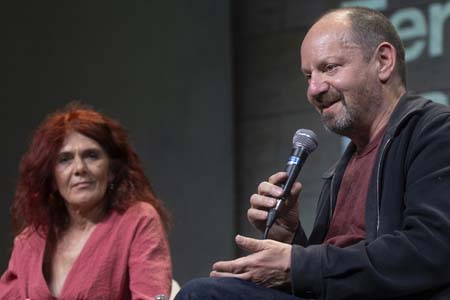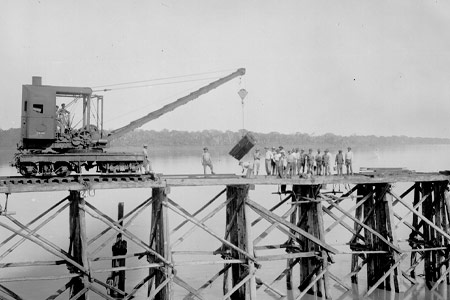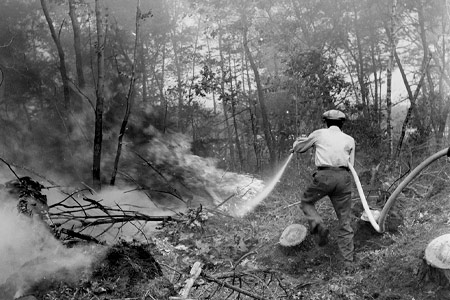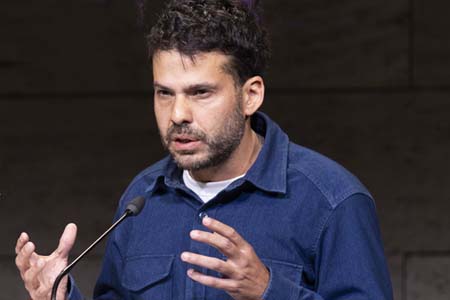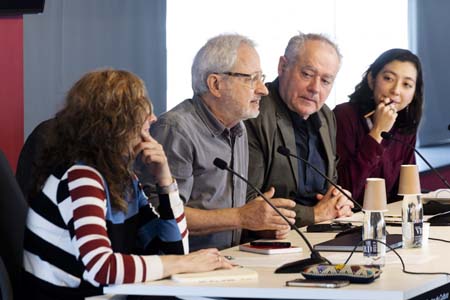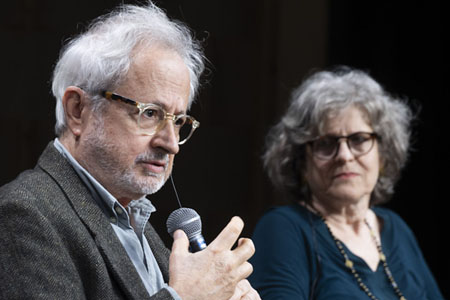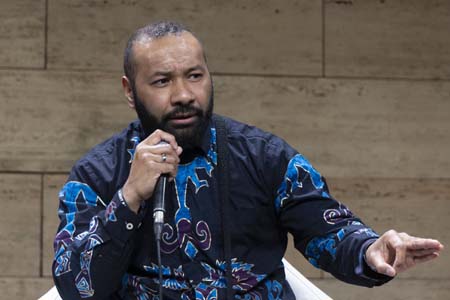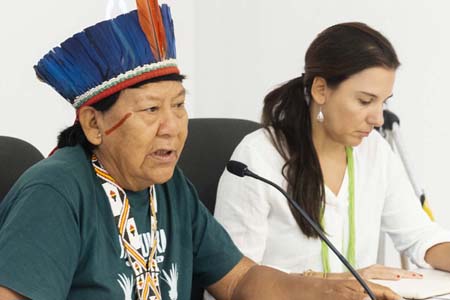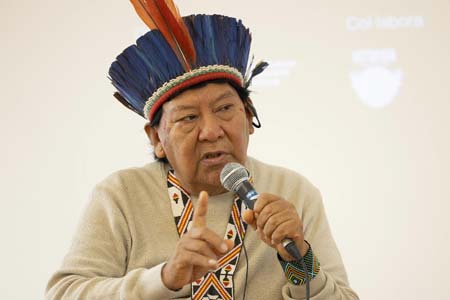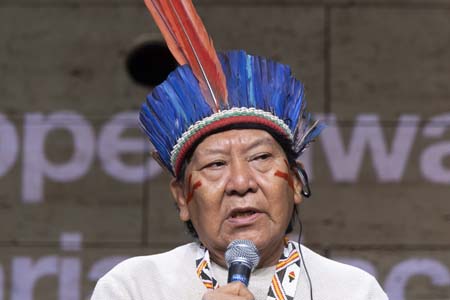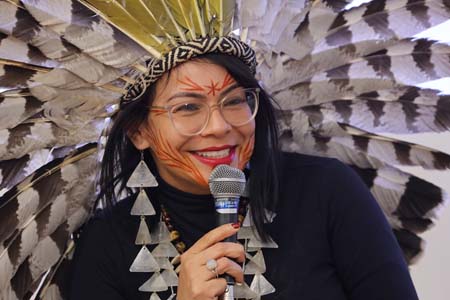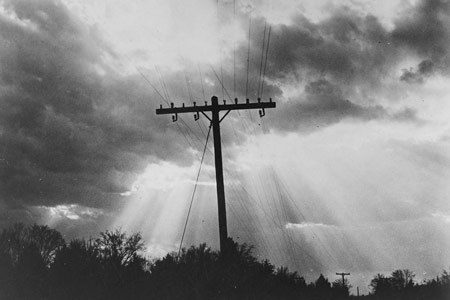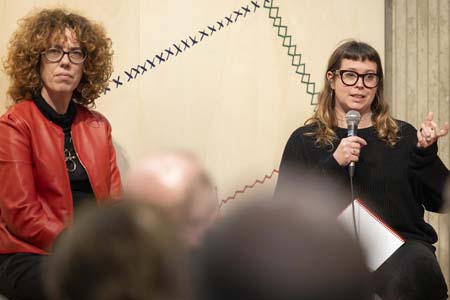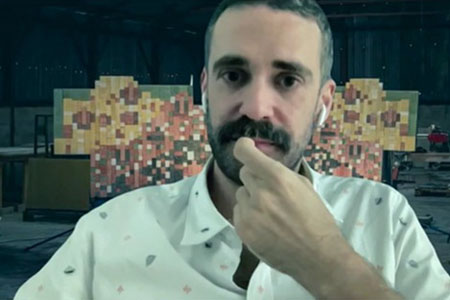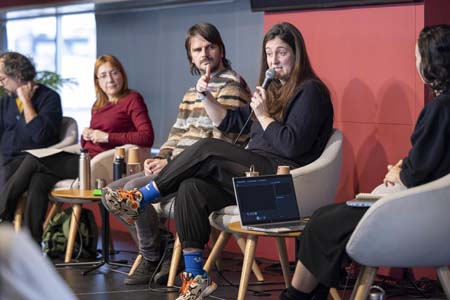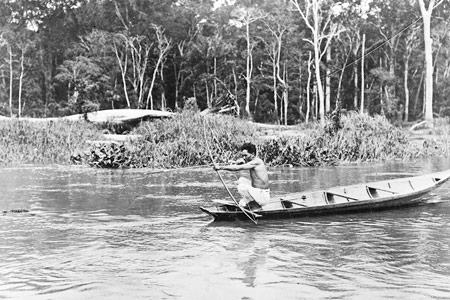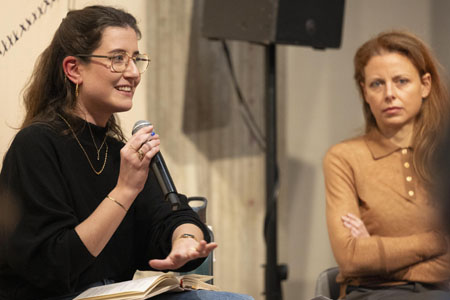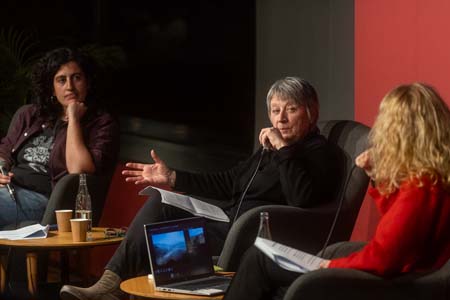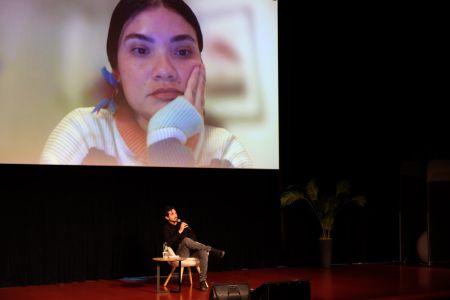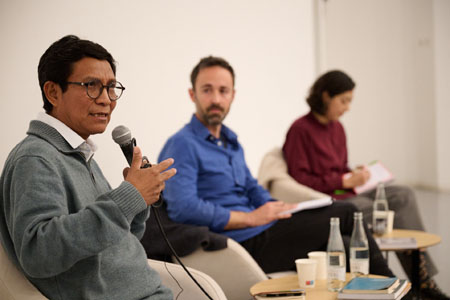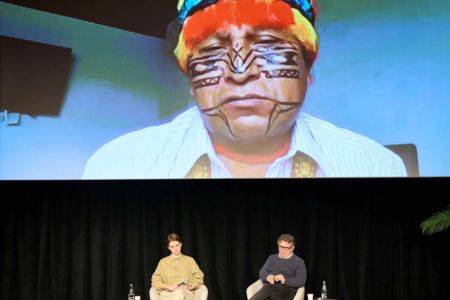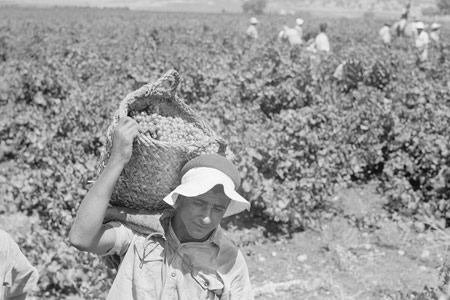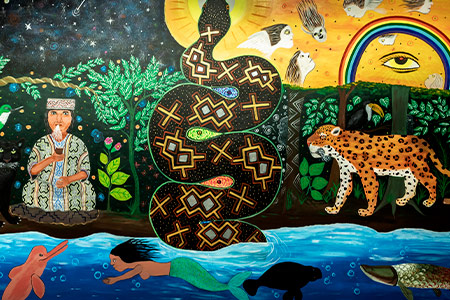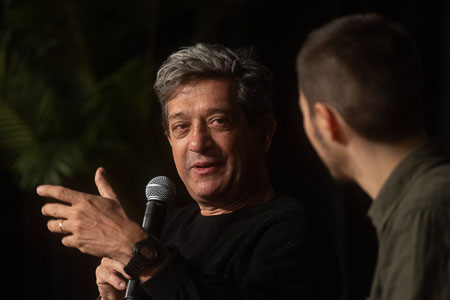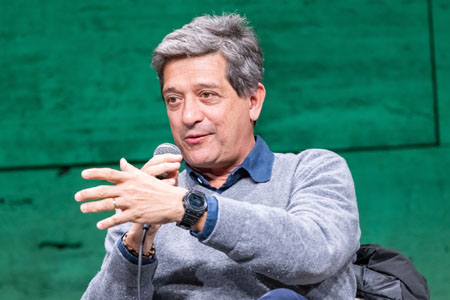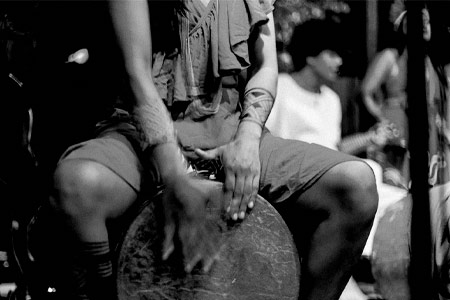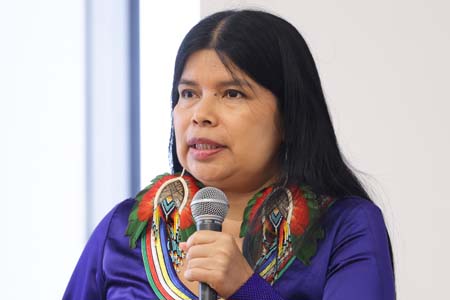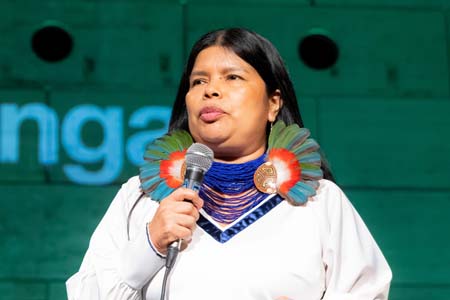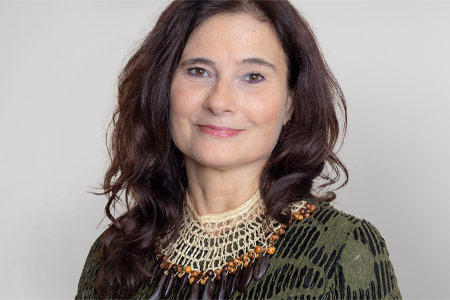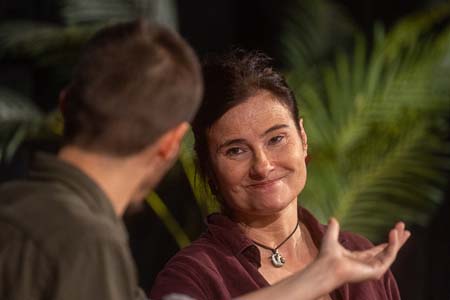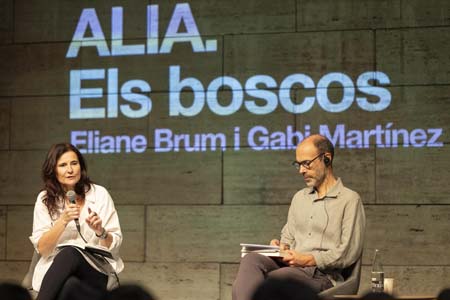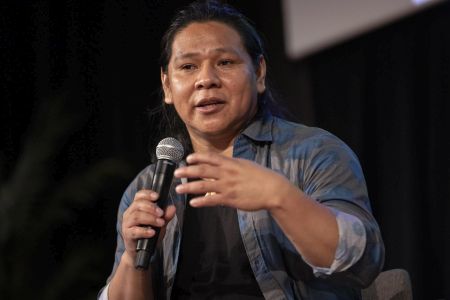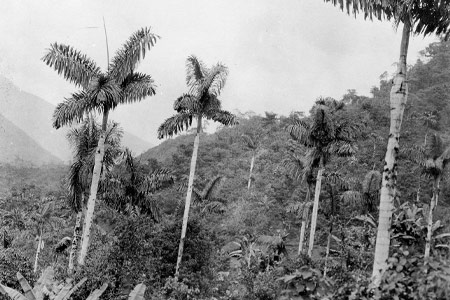Amazons
The Ancestral Future
Amazons. The Ancestral Future takes us into the immense natural and cultural richness of the territory, cities and indigenous communities of the Amazon to discover the art, the thinking and the huge ecological impact of a region that is central for the future of the planet.
Philippe Sands and Teresa Vicente
Rights for Nature
Philippe Sands and Teresa Vicente, eminent figures in the domain of environmental justice, describe their struggle to take legal action against ecocide, and to get ecosystems recognised as subjects with rights.
Wi-Fi in the Amazonia: The Dilemma of Connectivity
Ferran Esteve
The arrival of the internet in indigenous communities poses the challenge of how to participate in technological progress while maintaining cultural identity.
The Interaction Between Humans and Fire in a Changing World
Andrea Duane | Francisco Lloret
We need to rethink our relationship with fire, encouraging systems where fires can bring more benefits than harm.
Paulo Tavares
Forest Architectures
The architect and researcher Paulo Tavares challenges the forest/city dichotomy in his study of landscapes of the Amazon rainforest and advocates decolonisation of architecture and design, and to promote practices that are rooted in the earth, as fruit of interaction between humans and non-humans, and that question the division between nature and culture.
Eduardo Viveiros de Castro, Alexandre Surrallés, Karen Shiratori and Gemma Orobitg
Transversal Connections: Resonances of Perspectivism
In this session, we speak with Eduardo Viveiros de Castro who, from perspectivism, questions and critically reviews essential notions like nature, culture, humanity, person, body, relativism, universalism, and others, and we discuss the influence of his research in several disciplines.
Eduardo Viveiros de Castro and Déborah Danowski
The End as a Beginning: Worlds That Are to Come
Anthropologist Eduardo Viveiros de Castro and philosopher Déborah Danowski discuss contemporary and apocalyptic narratives of collapse and emphasise the richness of Indigenous cosmologies and cultures for thinking about the world that is to come.
Raki Ap
Guardians of the Forest
The tropical forests of West Papua, along with those of the Congo and the Amazon, are the lungs of the Earth. For centuries, indigenous communities have preserved the delicate balance of these ecosystems. A widely respected leader of Indigenous West Papuan struggles, Raki Ap emphasises the ...
Davi Kopenawa and Ana Maria Machado
The Impact of the Encounter and the Ethnographic Pact
Davi Kopenawa, leader of the Yanomami community, and anthropologist Ana Maria A. Machado speak about a meeting of worlds in this seminar co-organised by the CCCB and CINAF-UB, in the framework of Inter-Saberes. Dialogues with Indigenous Peoples.
Listening to the Rainforest: Words of a Yanomami Wise Man
A Morning with Davi Kopenawa
Davi Kopenawa, spiritual and political spokesperson of the Yanomami people and a world leader in the defence of the rights of indigenous communities, will be talking to us about his people’s intimate relationship with the rainforest and the tragic implications of its destruction. The session has a pedagogical dossier (in Catalan) so that the students can work on the contents beforehand in the classroom and thus make the most out of the lecture. ...
Davi Kopenawa
Holding up the Sky: Words of Ancestral Wisdom
Davi Kopenawa, spiritual and political leader of the Yanomami people, and pioneer in the struggle for the rights of the Indigenous people of the Amazon, discusses with anthropologists Ana Maria Machado and Gemma Orobitg on the wisdom of his ancestral culture and the urgent need to preserve life on Earth.
Daiara Tukano and Laura Pérez Gil
Indigenous Art and Women in the Visual Arts: Visions of an Ancestral Present-Future
A dialogue between the visual artist and activist Daiara Tukano and the anthropologist Laura Pérez Gilabout the connections between the visual arts and the ancestral knowledge of native peoples, and the relationship between the practice of art and activism in defence of the fundamental rights of indigenous peoples.
Designing With Ancestrality
Andreu Belsunces
The practice of spirituality is key to facing the profound eco-social transition in which we are currently immersed.
Rosa Cerarols (LAVIRAL) and Aura Vidal (Aigua és vida)
Water
This session explores how we can put water back at the centre as a shared resource, and the challenges we must face to ensure its sustainable and equitable management. How we can defend water as a fundamental right and transform the relationship we have with it to ensure its preservation and ...
Marc Talavera and Daniel Fernández Pascual
Food
This session looks at how the transformation of food and land into financial assets has fuelled global practices that degrade the environment and displace local cultures. We talk about how a system based on small, family farming can be sustained, and how to move towards a future where food ...
Writings of the Wild
Artistic Gestures in the Face of Climate Crisis
How can we record the wild today? How can we make out its presence amid layers of pollution, urbanization and noise? Philosopher Marta Tafalla, artist Silvia Zayas and filmmakers Emilio Fonseca and Xiana do Teixeiro invite us to view their practices of approaching and recording the wild as means of encounter, exchange and welcome.
Ancestral Future
Bernardo Gutiérrez
Brazil’s indigenous peoples are shaking off Western ideas of the future to preserve and create worlds in the present.
Paula Bruna and Gisela Torrents
Shelter
Faced with the end of the world, where do we find refuge? How can we collectively build a more liveable world, knowing that we live on a finite planet with limited resources? These questions are the starting point of the conversation, which centres on how we can transfer these concerns to our everyday lives and the spaces we inhabit.
Roser Vernet and Júlia Viejobueno
We Too Are Land. Knowledge for Inhabiting the Place
This conversation becomes an invitation to value ways of life that focus on respect for and care of the land, moving away from extractivist logics and excessive competition. With the determination to continue being a living, active part of the land that defines them, Vernet and Viejobueno reflect ...
Presences
Conversation with Juan Francisco Valdez and Priscila Tapajowara
According to indigenous peoples, territory is not seen as somewhere that’s separate from humans but rather as a single ecological system where both the human and non-human are integrated within a single cosmos. The anthropologist and documentary filmmaker Juan Francisco Valdez and the photographer and filmmaker Priscila Tapajowara reflect on a type of relationship with the beings that populate the territory and influence daily life: spirits, spectres, non-human inhabitants, presences in and threats to the territory. ...
Nukuri kahtiro turi: the plant world
Talk with João Paulo Lima Barreto and Karen Shiratori
The indigenous peoples of the northeastern Amazon, especially the Yepamahsã (or Tukano), see the plant world as the clothing of the earth. From this point of view, deforestation is considered to be the act of stripping the land. ...
«Cuencas Sagradas». A Journey to Indigenous Governance
Thirty indigenous nations in the upper Amazon, in Ecuador and Peru, are self-organizing in the «Cuencas Sagradas» alliance to defend the jungle. In this session, the Achuar indigenous leader Uyunkar Domingo Peas Nampichkai talks with journalists Francesc Badia ...
A Piece of Land: The Beginnings and The End
Júlia Viejobueno Cavallé
A look at the future of the rural class and the difficulties involved in sustaining a way of life and of understanding the world.
Claudi Carreras and Andrés Cardona advocate for a deeper understanding of Amazonian culture
As part of the exhibition “Amazons. The Ancestral Future”
Claudi Carreras, the exhibition’s curator, and Andrés Cardona, a photographer from Caquetá, Colombia, have undertaken extensive research and audiovisual documentation on the Amazonian region, which is now on display at the CCCB’s exhibition. In this conversation, they ...
Archaeology of the Jungle
A Morning with Eduardo Neves
Eduardo Neves, the archaeologist of reference in the study of the Amazon jungle, overturns the false conception of “virgin forest” and shows how Amazonia today is the product of thousands of years of indigenous occupation. The session has a pedagogical dossier (in ...
Eduardo Neves
Wild Memory
The archaeologist Eduardo Neves has worked to debunk the myth of the Amazon as a realm without humans, pointing out that it was intensely populated by Indigenous societies which shaped it to become the centre of biodiversity for which is known today, but which is also being ever more rapidly destroyed.
Soundscapes of the Northwest Amazon: Rhythms, Land and Culture in Pará
Natalia Figueredo
A journey through the evolution of the different musical styles present in Amazonia and their connection with the land.
Txai Suruí
Postponing the End of the World
The activist and youth leader Txai Suruí speaks with the journalist and writer Eliane Brum about the struggle of young people who are trying to combat the climate crisis in Brazil, and about the resistance of Indigenous communities against extractivism, deforestation, enormous fires, and about bodies that make it possible to postpone the end of the world.
Defending the Rights of the Jungle
A morning with Patricia Gualinga
In this conversation, Patricia Gualinga, leader of the Kichwa people and renowned activist, will be talking about the Living Forest and the resistance of her people, an international reference in the defence of indigenous territorial and cultural rights. The session has a pedagogical ...
Patricia Gualinga
Living Forest
Patricia Gualinga, climate activist and defender of women’s rights, whose work has been recognised with the Olof Palme Prize, speaks with the journalist and writer Eliane Brum about the long struggle of the Kichwa people of Sarayaku, in the Ecuadorian Amazon rainforest, to defend nature and the lives of Indigenous peoples.
Eliane Brum: “The climate collapse is the responsibility of a minority"
Eliane Brum is a journalist and writer, and one of the leading voices in exploring the environmental and political struggles of the Amazon. Brum highlights how a powerful and predatory minority is destroying the rainforest and violating the rights of indigenous peoples and communities along ...
Ehuana Yaira Ianomami
Gigantic Women
The artist, researcher, and Yanomami leader Ehuana Yaira Yanomami speaks about the body-land viewpoint of rainforest women and tells the journalist and writer, Eliane Brum about the present situation of her people who are threatened with genocide by illegal mining. Esta actividad forma parte ...
Eliane Brum and Gabi Martínez
The Amazon and climate change
What keys can the Amazon give us to radically change the way we relate to the world? What can we learn from peoples who have not separated themselves from nature? Inaugural conference of the ALIA educational programme for the 2024-2025 academic year.
The Cultures of the Jungle
A morning with Rember Yahuarcani
Artist Rember Yahuarcani, a well-known painter and activist from the north of Amazonia in Peru, talks about the ancestral history of the Witoto people of the Amazon jungle and the potential of making indigenous cultures known. The session has a pedagogical dossier (in Catalan) ...
The Political Nature of the Forest
Paulo Tavares
The rainforest is an engineered construction resulting from the diverse ways in which indigenous societies relate to it.
